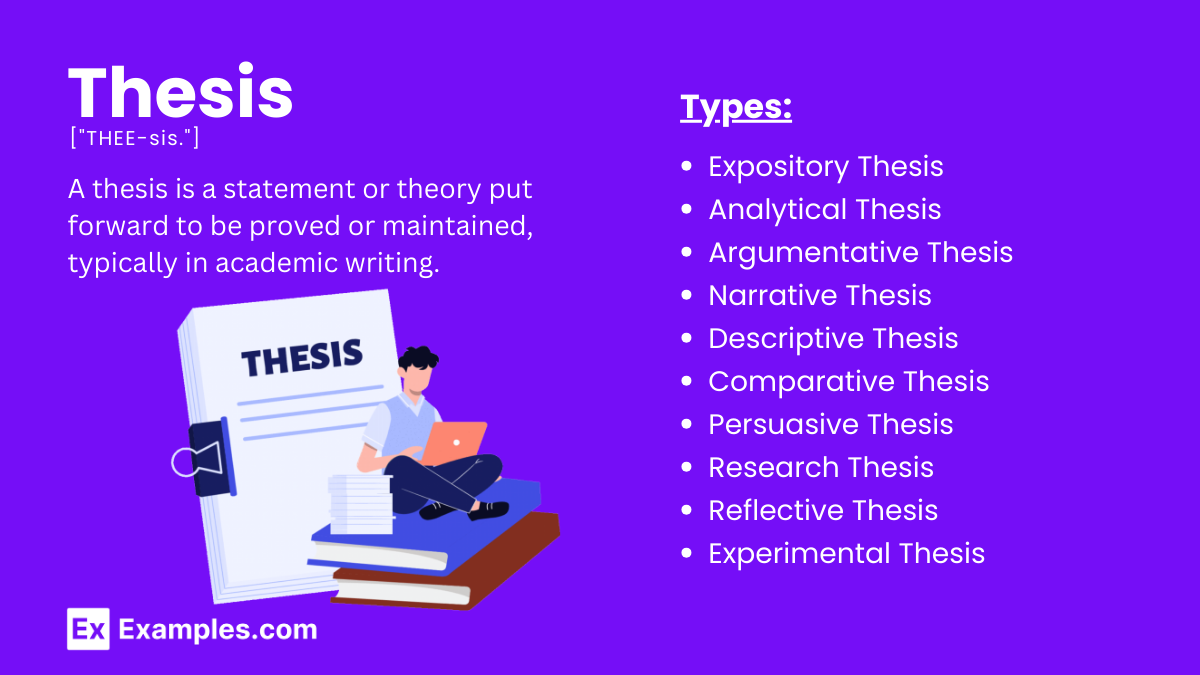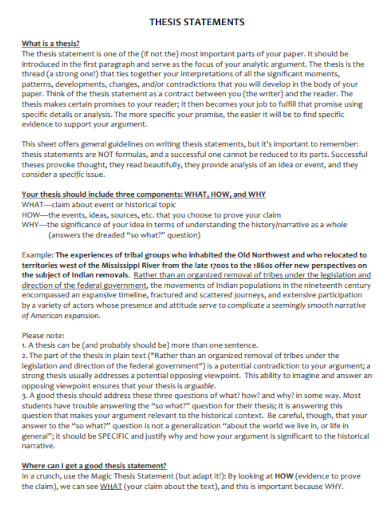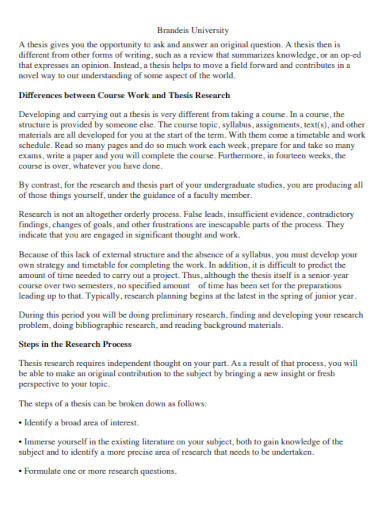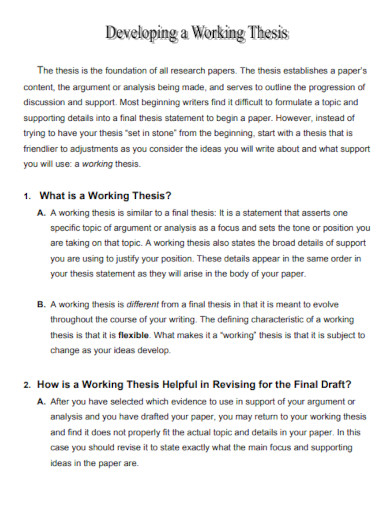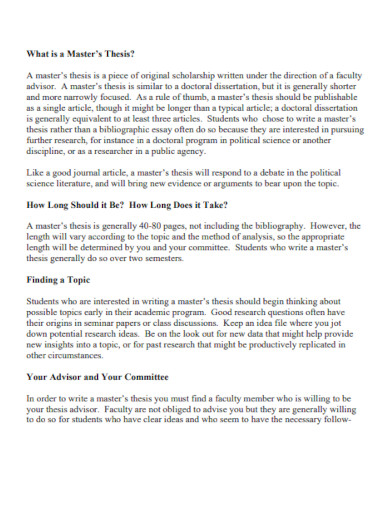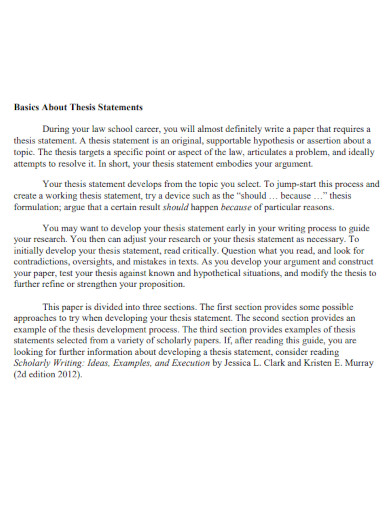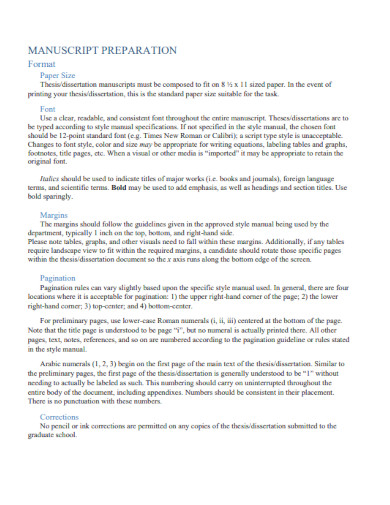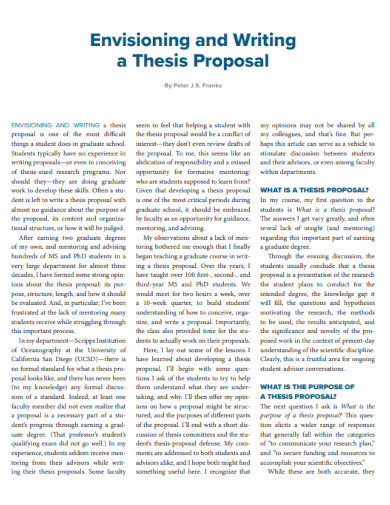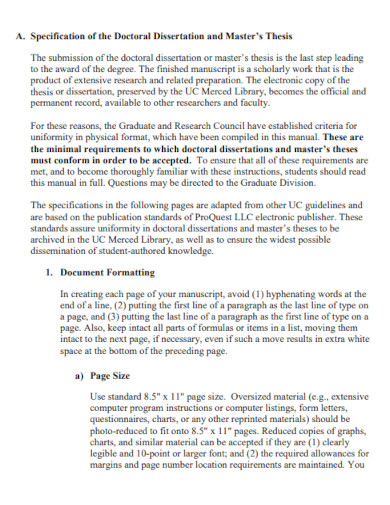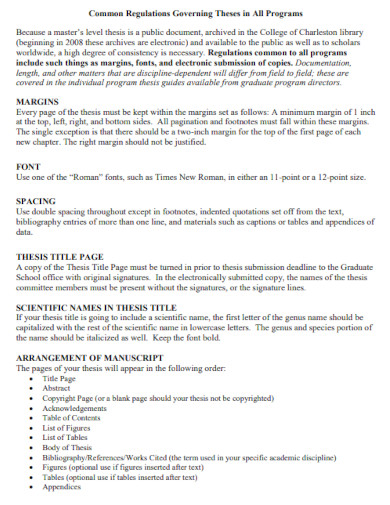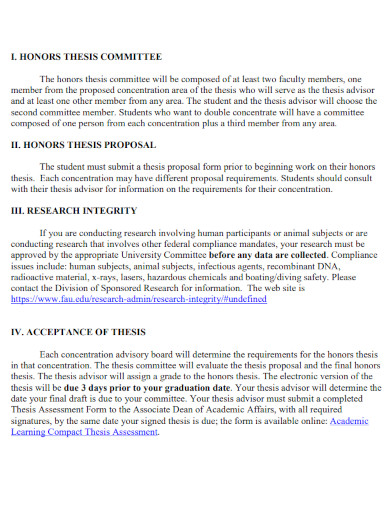100+ Thesis Examples
A thesis is a comprehensive research paper that presents a central argument or claim supported by evidence. Typically written by students pursuing advanced degrees, a thesis demonstrates a deep understanding of a subject. It includes a clear research question, literature review, methodology, analysis, and conclusions. The process enhances critical thinking, research skills, and subject expertise, culminating in a significant academic contribution. For those starting out, thesis templates can help organize ideas and structure the paper effectively.
Thesis paper. Many students tend to fear this word and there is a good reason as to why they do. You may already have tried making a thesis before and at some point, you would also realize the trial and error stage of making one.
What Is a Thesis?
A thesis a research paper writing that is made for a purpose. Thesis papers consists of a research statement, a kind of statement, a theory, a purpose. The thesis is made in order to prove your theory and make it into a fact. There are a lot of kinds of thesis, but the most common thesis kinds are analytical thesis, an argumentative thesis and an explanatory thesis.
Types of Thesis
Analytical Thesis
An analytical thesis breaks down an issue or idea into its component parts, evaluates the topic, and presents this breakdown and evaluation to the audience. It is often used in literature, history, and social sciences.
Expository Thesis
An expository thesis explains a topic to the audience. It provides a comprehensive overview of a subject, presenting facts and analysis without personal opinion. This type is common in science and technical writing.
Argumentative Thesis
An argumentative thesis makes a claim about a topic and justifies this claim with specific evidence. The goal is to persuade the reader of a particular viewpoint. This type is prevalent in fields like philosophy, political science, and law.
Narrative Thesis
A narrative thesis tells a story or recounts an event. It includes personal experiences or detailed descriptions of events to support the main argument. This type is often used in creative writing and autobiographies.
Comparative Thesis
A comparative thesis compares and contrasts two or more subjects, evaluating their similarities and differences. It is commonly used in literature, history, and social sciences to draw meaningful conclusions.
Descriptive Thesis
A descriptive thesis provides a detailed description of a topic without arguing a specific point. It paints a vivid picture of the subject, often used in fields like anthropology and sociology to explore cultural phenomena.
Empirical Thesis
An empirical thesis is based on original research and data collection. It involves experiments, surveys, or observations to answer a specific research question. This type is typical in natural and social sciences.
Examples of Thesis
Thesis Examples in Literature
1: Analysis of a Single Work
Title: “The Use of Symbolism in ‘The Great Gatsby’ by F. Scott Fitzgerald”
Thesis Statement: In F. Scott Fitzgerald’s ‘The Great Gatsby,’ the use of symbolism, particularly through the green light at the end of Daisy’s dock, the eyes of Doctor T. J. Eckleburg, and the Valley of Ashes, serves to illustrate the overarching themes of the American Dream, moral decay, and the quest for identity.
2: Comparative Analysis
Title: “The Role of Women in ‘Pride and Prejudice’ by Jane Austen and ‘Jane Eyre’ by Charlotte Brontë”
Thesis Statement: While both Jane Austen’s ‘Pride and Prejudice’ and Charlotte Brontë’s ‘Jane Eyre’ critique the limited roles and expectations of women in 19th-century British society, Austen’s Elizabeth Bennet and Brontë’s Jane Eyre embody different forms of rebellion against societal norms, highlighting the evolving perception of women’s independence and self-worth.
3: Thematic Analysis
Title: “Exploring the Theme of Isolation in ‘Frankenstein’ by Mary Shelley”
Thesis Statement: Mary Shelley’s ‘Frankenstein’ explores the theme of isolation through the experiences of Victor Frankenstein and his creation, the monster, demonstrating how isolation leads to destructive consequences for both individuals and society.
4: Character Analysis
Title: “The Evolution of Hamlet’s Character in William Shakespeare’s ‘Hamlet'”
Thesis Statement: In William Shakespeare’s ‘Hamlet,’ the protagonist undergoes a significant transformation from a grief-stricken and indecisive prince to a determined and introspective avenger, reflecting the complexities of human nature and the impact of existential contemplation.
5: Genre Analysis
Title: “Gothic Elements in ‘Wuthering Heights’ by Emily Brontë”
Thesis Statement: Emily Brontë’s ‘Wuthering Heights’ employs key elements of Gothic literature, including a brooding atmosphere, supernatural occurrences, and the exploration of human psychology, to create a haunting and timeless tale of passion and revenge.
6: Symbolic Analysis
Title: “The Symbolism of the Green Light in ‘The Great Gatsby’ by F. Scott Fitzgerald”
Thesis Statement: The green light in F. Scott Fitzgerald’s ‘The Great Gatsby’ symbolizes Gatsby’s unattainable dreams and the elusive nature of the American Dream, reflecting the broader themes of hope, disillusionment, and the pursuit of an idealized future.
7: Historical Context
Title: “Historical Influences on George Orwell’s ‘1984’”
Thesis Statement: George Orwell’s ‘1984’ draws heavily on the political climate of the early 20th century, particularly the rise of totalitarian regimes and the impact of World War II, to present a dystopian vision of a future where government surveillance and propaganda control every aspect of life.
8: Feminist Critique
Title: “Feminist Perspectives in ‘The Handmaid’s Tale’ by Margaret Atwood”
Thesis Statement: Margaret Atwood’s ‘The Handmaid’s Tale’ critiques the patriarchal structures of contemporary society by depicting a dystopian world where women’s rights are stripped away, illustrating the extreme consequences of gender oppression and the resilience of female solidarity.
9: Psychoanalytic Criticism
Title: “Freudian Elements in ‘The Turn of the Screw’ by Henry James”
Thesis Statement: Henry James’s ‘The Turn of the Screw’ can be interpreted through a Freudian lens, where the governess’s experiences and the ambiguous nature of the ghosts reflect deep-seated psychological conflicts and repressed desires, highlighting the novella’s exploration of the human psyche.
10: Postcolonial Analysis
Title: “Postcolonial Themes in ‘Things Fall Apart’ by Chinua Achebe”
Thesis Statement: Chinua Achebe’s ‘Things Fall Apart’ addresses postcolonial themes by portraying the clash between traditional Igbo society and British colonial forces, illustrating the devastating effects of colonialism on indigenous cultures and the struggle for cultural identity and autonomy.
Thesis Examples for Essays
1: Persuasive Essay
Topic: “The Importance of Renewable Energy”
Thesis Statement: Governments around the world should invest heavily in renewable energy sources like solar and wind power to reduce dependency on fossil fuels, combat climate change, and create sustainable job opportunities.
2: Analytical Essay
Topic: “The Symbolism in ‘The Great Gatsby’ by F. Scott Fitzgerald”
Thesis Statement: In ‘The Great Gatsby,’ F. Scott Fitzgerald uses the symbols of the green light, the eyes of Doctor T. J. Eckleburg, and the Valley of Ashes to illustrate the moral and social decay of America during the Roaring Twenties.
3: Expository Essay
Topic: “The Impact of Social Media on Teenagers”
Thesis Statement: Social media has significantly impacted teenagers’ mental health, social skills, and academic performance, both positively and negatively, necessitating a balanced approach to its usage.
4: Compare and Contrast Essay
Topic: “Public vs. Private School Education”
Thesis Statement: While public schools offer a more diverse social environment and extracurricular opportunities, private schools provide smaller class sizes and specialized curriculums, making the choice dependent on individual student needs and family priorities.
5: Cause and Effect Essay
Topic: “The Causes and Effects of the Rise in Obesity Rates”
Thesis Statement: The rise in obesity rates can be attributed to poor dietary habits, sedentary lifestyles, and genetic factors, leading to serious health issues such as diabetes, heart disease, and decreased life expectancy.
6: Narrative Essay
Topic: “A Life-Changing Experience”
Thesis Statement: My trip to volunteer at a rural school in Kenya was a life-changing experience that taught me the value of education, the importance of cultural exchange, and the power of empathy and compassion.
7: Argumentative Essay
Topic: “The Necessity of Free College Education”
Thesis Statement: Free college education is essential for ensuring equal opportunities for all, reducing student debt burdens, and fostering a more educated and productive workforce.
8: Descriptive Essay
Topic: “The Beauty of a Sunset”
Thesis Statement: A sunset, with its vibrant hues and serene ambiance, evokes a sense of peace and reflection, illustrating nature’s ability to inspire awe and tranquility in our daily lives.
9: Definition Essay
Topic: “What is Happiness?”
Thesis Statement: Happiness is a complex and multifaceted emotion characterized by feelings of contentment, fulfillment, and joy, influenced by both internal factors like mindset and external factors such as relationships and achievements.
10: Process Essay
Topic: “How to Bake the Perfect Chocolate Cake”
Thesis Statement: Baking the perfect chocolate cake involves selecting high-quality ingredients, precisely following the recipe, and understanding the nuances of baking techniques, from mixing to temperature control.
Thesis Examples for Argumentative Essay
1: Gun Control
Topic: “Stricter Gun Control Laws”
Thesis Statement: Stricter gun control laws are necessary to reduce gun violence in the United States, as evidenced by lower rates of gun-related deaths in countries with stringent regulations.
2: Climate Change
Topic: “Addressing Climate Change”
Thesis Statement: To effectively combat climate change, governments worldwide must implement aggressive policies to reduce carbon emissions, invest in renewable energy, and promote sustainable practices.
3: Animal Testing
Topic: “Ban on Animal Testing”
Thesis Statement: Animal testing for cosmetics should be banned globally due to its ethical implications, the availability of alternative testing methods, and the questionable reliability of animal-based results for human safety.
4: Education Reform
Topic: “Standardized Testing in Schools”
Thesis Statement: Standardized testing should be eliminated in schools as it narrows the curriculum, causes undue stress to students, and fails to accurately measure a student’s potential and abilities.
5: Universal Basic Income
Topic: “Implementing Universal Basic Income”
Thesis Statement: Implementing a universal basic income would help alleviate poverty, reduce income inequality, and provide financial stability in an increasingly automated and unpredictable job market.
6: Health Care
Topic: “Universal Health Care”
Thesis Statement: Universal health care should be adopted in the United States to ensure that all citizens have access to essential medical services, reduce overall healthcare costs, and improve public health outcomes.
7: Immigration Policy
Topic: “Reforming Immigration Policies”
Thesis Statement: Comprehensive immigration reform is essential to address undocumented immigration, protect human rights, and contribute to economic growth by recognizing the contributions of immigrants to society.
8: Death Penalty
Topic: “Abolishing the Death Penalty”
Thesis Statement: The death penalty should be abolished as it is an inhumane practice, prone to judicial errors, and has not been proven to deter crime more effectively than life imprisonment.
9: Social Media Regulation
Topic: “Regulating Social Media Platforms”
Thesis Statement: Social media platforms should be regulated to prevent the spread of misinformation, protect user privacy, and reduce the negative impact on mental health, particularly among adolescents.
10: College Tuition
Topic: “Free College Tuition”
Thesis Statement: Providing free college tuition at public universities would increase access to higher education, reduce student debt, and help create a more educated and skilled workforce to meet future economic demands.
Thesis Examples for Research Papers
1: Environmental Science
Topic: “Impact of Plastic Pollution on Marine Life”
Thesis Statement: Plastic pollution in the oceans is causing significant harm to marine life, leading to ingestion and entanglement of plastic debris, disruption of ecosystems, and bioaccumulation of toxic substances in the food chain.
2: Psychology
Topic: “Effects of Social Media on Adolescent Mental Health”
Thesis Statement: Excessive use of social media negatively impacts adolescent mental health by increasing the risk of anxiety, depression, and poor sleep quality, while also contributing to body image issues and cyberbullying.
3: Education
Topic: “Benefits of Bilingual Education Programs”
Thesis Statement: Bilingual education programs enhance cognitive abilities, improve academic performance, and promote cultural awareness, making them a valuable approach in the increasingly globalized and multicultural society.
4: Public Health
Topic: “Addressing the Obesity Epidemic”
Thesis Statement: Addressing the obesity epidemic requires a multifaceted approach that includes implementing public health campaigns, promoting healthy eating habits, increasing physical activity, and regulating food advertising targeted at children.
5: Economics
Topic: “Universal Basic Income and Economic Stability”
Thesis Statement: Implementing a universal basic income can provide economic stability by reducing poverty, ensuring a safety net during economic downturns, and stimulating consumer spending, thereby supporting overall economic growth.
6: Political Science
Topic: “Impact of Voter ID Laws on Voter Turnout”
Thesis Statement: Voter ID laws disproportionately reduce voter turnout among minority and low-income populations, undermining the democratic process and exacerbating existing inequalities in political participation.
7: Sociology
Topic: “Gender Stereotypes in Media Representation”
Thesis Statement: Media representation perpetuates gender stereotypes by consistently portraying men and women in traditional roles, which reinforces societal norms and limits the opportunities for gender equality.
8: Technology
Topic: “Artificial Intelligence in Healthcare”
Thesis Statement: The integration of artificial intelligence in healthcare can improve patient outcomes, enhance diagnostic accuracy, and streamline administrative processes, but it also raises ethical concerns regarding data privacy and the potential for job displacement.
9: History
Topic: “Causes and Consequences of the American Civil War”
Thesis Statement: The American Civil War was primarily caused by deep-seated economic, social, and political differences between the North and South, particularly over the issue of slavery, and it resulted in significant social and political changes, including the abolition of slavery and the reconstruction of the South.
10: Environmental Policy
Topic: “Renewable Energy Policies and Their Effectiveness”
Thesis Statement: Renewable energy policies, such as subsidies for solar and wind power and carbon pricing, are effective in reducing greenhouse gas emissions and promoting sustainable energy sources, but their success depends on comprehensive implementation and international cooperation.
Thesis Examples for Informative Essay
1: Environmental Science
Topic: “The Water Cycle”
Thesis Statement: The water cycle, which includes processes such as evaporation, condensation, precipitation, and infiltration, is essential for distributing water across the Earth’s surface and maintaining ecological balance.
2: Health and Wellness
Topic: “The Benefits of Regular Exercise”
Thesis Statement: Regular exercise is crucial for maintaining physical health, improving mental well-being, and reducing the risk of chronic diseases such as obesity, diabetes, and cardiovascular conditions.
3: Technology
Topic: “The Development of Artificial Intelligence”
Thesis Statement: The development of artificial intelligence has progressed from simple machine learning algorithms to complex neural networks capable of performing tasks such as natural language processing, image recognition, and autonomous driving.
4: History
Topic: “The Causes and Effects of the American Civil Rights Movement”
Thesis Statement: The American Civil Rights Movement was driven by factors such as racial segregation, economic disparity, and political disenfranchisement, leading to significant legislative and social changes that improved the rights and freedoms of African Americans.
5: Education
Topic: “The Montessori Method of Education”
Thesis Statement: The Montessori method of education, developed by Dr. Maria Montessori, emphasizes self-directed learning, hands-on activities, and collaborative play, fostering independence and critical thinking skills in young children.
6: Sociology
Topic: “The Impact of Urbanization on Community Life”
Thesis Statement: Urbanization significantly impacts community life by altering social structures, increasing economic opportunities, and presenting challenges such as overcrowding, pollution, and loss of green spaces.
7: Environmental Policy
Topic: “The Role of Renewable Energy in Combating Climate Change”
Thesis Statement: Renewable energy sources, such as solar, wind, and hydroelectric power, play a critical role in combating climate change by reducing greenhouse gas emissions and providing sustainable alternatives to fossil fuels.
8: Business
Topic: “The Rise of Gig Economy”
Thesis Statement: The rise of the gig economy has transformed the labor market by offering flexible work opportunities, fostering entrepreneurship, and posing challenges such as job insecurity and lack of benefits for workers.
9: Psychology
Topic: “The Importance of Sleep for Cognitive Function”
Thesis Statement: Adequate sleep is essential for cognitive function, memory consolidation, and emotional regulation, with chronic sleep deprivation leading to impaired mental performance and increased risk of mental health disorders.
10: Cultural Studies
Topic: “The Influence of Japanese Anime on Global Pop Culture”
Thesis Statement: Japanese anime has significantly influenced global pop culture by shaping trends in fashion, art, and storytelling, and fostering a dedicated international fanbase that celebrates its unique aesthetic and thematic elements.
Thesis Examples for Synthesis Essay
1: Climate Change
Topic: “Combating Climate Change through Policy and Innovation”
Thesis Statement: Combating climate change requires a multifaceted approach that includes stringent environmental policies, investment in renewable energy technologies, and community-based initiatives to reduce carbon footprints, integrating efforts from government, industry, and society.
2: Education
Topic: “Balancing Technology and Traditional Teaching Methods in Education”
Thesis Statement: A balanced approach to education that combines the benefits of technology, such as interactive learning tools and online resources, with traditional teaching methods, like face-to-face instruction and hands-on activities, can enhance student engagement and academic achievement.
3: Health
Topic: “Addressing the Opioid Crisis through Comprehensive Strategies”
Thesis Statement: Addressing the opioid crisis requires comprehensive strategies that include better access to addiction treatment programs, stricter regulations on prescription opioids, and increased public awareness campaigns to educate communities about the risks of opioid misuse.
4: Technology
Topic: “The Impact of Social Media on Political Mobilization”
Thesis Statement: Social media has revolutionized political mobilization by providing platforms for grassroots campaigns, enabling real-time communication, and fostering civic engagement, but it also poses challenges such as the spread of misinformation and echo chambers.
5: Business
Topic: “Corporate Social Responsibility and Its Impact on Brand Loyalty”
Thesis Statement: Corporate social responsibility (CSR) initiatives, when genuinely implemented, can significantly enhance brand loyalty by aligning company values with consumer expectations, fostering trust, and contributing positively to societal well-being.
6: Sociology
Topic: “The Role of Gender Stereotypes in Media Representation”
Thesis Statement: Media representation perpetuates gender stereotypes by consistently depicting men and women in traditional roles, which influences societal perceptions and expectations, but progressive portrayals are gradually challenging these norms and promoting gender equality.
7: Environmental Policy
Topic: “Sustainable Urban Development and Green Infrastructure”
Thesis Statement: Sustainable urban development that incorporates green infrastructure, such as green roofs, urban gardens, and eco-friendly public transportation, is essential for mitigating environmental impacts, improving public health, and enhancing the quality of urban life.
8: Psychology
Topic: “The Effects of Mindfulness Practices on Mental Health”
Thesis Statement: Mindfulness practices, including meditation, yoga, and mindful breathing, have been shown to significantly improve mental health by reducing stress, enhancing emotional regulation, and promoting overall well-being, supported by a growing body of scientific research.
9: Economics
Topic: “Universal Basic Income as a Solution to Economic Inequality”
Thesis Statement: Universal Basic Income (UBI) presents a viable solution to economic inequality by providing financial security, reducing poverty, and supporting economic stability, though it requires careful consideration of funding mechanisms and potential societal impacts.
10: Public Health
Topic: “The Importance of Vaccination Programs in Preventing Epidemics”
Thesis Statement: Vaccination programs are crucial for preventing epidemics, protecting public health, and achieving herd immunity, as evidenced by the successful eradication of diseases like smallpox and the control of outbreaks such as measles and influenza.
Thesis Examples for Persuasive Essays
1: Gun Control
Topic: “Stricter Gun Control Laws”
Thesis Statement: Stricter gun control laws are essential to reduce gun violence in the United States, as they will help prevent firearms from falling into the wrong hands, decrease the number of mass shootings, and enhance public safety.
2: Climate Change
Topic: “Urgent Action on Climate Change”
Thesis Statement: Immediate and robust action is needed to combat climate change, including reducing carbon emissions, transitioning to renewable energy sources, and implementing sustainable practices to mitigate the devastating effects on our planet.
3: Animal Rights
Topic: “Ban on Animal Testing for Cosmetics”
Thesis Statement: Animal testing for cosmetics should be banned worldwide due to its ethical implications, the availability of alternative testing methods, and the questionable reliability of animal-based results for human safety.
4: Education Reform
Topic: “Abolishing Standardized Testing in Schools”
Thesis Statement: Standardized testing should be abolished in schools as it narrows the curriculum, places undue stress on students, and fails to accurately measure a student’s potential and abilities, thereby hindering educational growth.
5: Universal Health Care
Topic: “Adopting Universal Health Care in the United States”
Thesis Statement: The United States should adopt a universal health care system to ensure that all citizens have access to essential medical services, reduce overall healthcare costs, and improve public health outcomes.
6: Immigration Policy
Topic: “Reforming Immigration Policies”
Thesis Statement: Comprehensive immigration reform is essential to address undocumented immigration, protect human rights, and contribute to economic growth by recognizing the contributions of immigrants to society and ensuring a fair, efficient legal process.
7: Death Penalty
Topic: “Abolishing the Death Penalty”
Thesis Statement: The death penalty should be abolished as it is an inhumane practice, prone to judicial errors, and has not been proven to deter crime more effectively than life imprisonment, while also being more costly to taxpayers.
8: Social Media Regulation
Topic: “Regulating Social Media Platforms”
Thesis Statement: Social media platforms should be regulated to prevent the spread of misinformation, protect user privacy, and reduce the negative impact on mental health, particularly among adolescents, to create a safer online environment.
9: College Tuition
Topic: “Providing Free College Tuition”
Thesis Statement: Providing free college tuition at public universities would increase access to higher education, reduce student debt, and help create a more educated and skilled workforce to meet future economic demands.
10: Renewable Energy
Topic: “Investing in Renewable Energy Sources”
Thesis Statement: Governments should invest heavily in renewable energy sources like solar and wind power to reduce dependency on fossil fuels, combat climate change, and create sustainable job opportunities, ensuring a cleaner and healthier future.
Thesis Examples for Analysis Essays
1: Literary Analysis
Topic: “Symbolism in ‘The Great Gatsby’ by F. Scott Fitzgerald”
Thesis Statement: In ‘The Great Gatsby,’ F. Scott Fitzgerald uses symbols such as the green light, the Valley of Ashes, and the eyes of Doctor T. J. Eckleburg to critique the American Dream and explore themes of ambition, disillusionment, and moral decay.
2: Film Analysis
Topic: “Themes of Redemption in ‘The Shawshank Redemption'”
Thesis Statement: ‘The Shawshank Redemption’ explores themes of hope, friendship, and the human spirit’s resilience, using the character arcs of Andy Dufresne and Red to highlight the transformative power of hope and redemption within the confines of a corrupt prison system.
3: Rhetorical Analysis
Topic: “Martin Luther King Jr.’s ‘I Have a Dream’ Speech”
Thesis Statement: In his ‘I Have a Dream’ speech, Martin Luther King Jr. employs rhetorical strategies such as repetition, parallelism, and powerful imagery to effectively convey his vision of racial equality and galvanize the civil rights movement.
4: Historical Analysis
Topic: “Causes of the Fall of the Roman Empire”
Thesis Statement: The fall of the Roman Empire was the result of a complex interplay of factors, including political corruption, economic instability, military defeats, and the gradual erosion of civic virtue, which collectively undermined the empire’s ability to sustain itself.
5: Character Analysis
Topic: “The Complexity of Hamlet in William Shakespeare’s ‘Hamlet'”
Thesis Statement: In William Shakespeare’s ‘Hamlet,’ the titular character’s complexity is revealed through his introspective nature, moral ambiguity, and fluctuating resolve, which collectively illustrate the play’s exploration of existential themes and the human condition.
6: Social Analysis
Topic: “The Impact of Social Media on Modern Communication”
Thesis Statement: Social media has significantly altered modern communication by enabling instantaneous sharing of information and fostering global connectivity, while also contributing to issues such as reduced face-to-face interactions, cyberbullying, and the spread of misinformation.
7: Cultural Analysis
Topic: “Cultural Significance of Traditional Festivals”
Thesis Statement: Traditional festivals play a crucial role in preserving cultural heritage, fostering community identity, and promoting social cohesion, as they provide a platform for the transmission of customs, values, and shared history across generations.
8: Economic Analysis
Topic: “The Effects of Globalization on Local Economies”
Thesis Statement: Globalization has profoundly impacted local economies by enhancing market access, fostering economic growth, and encouraging cultural exchange, but it has also led to job displacement, wage suppression, and the erosion of local industries in some regions.
9: Psychological Analysis
Topic: “Freudian Themes in ‘The Turn of the Screw’ by Henry James”
Thesis Statement: Henry James’s ‘The Turn of the Screw’ can be analyzed through a Freudian lens, where the governess’s experiences and the ambiguous nature of the ghosts reflect deep-seated psychological conflicts, repressed desires, and the complexities of the human psyche.
10: Political Analysis
Topic: “The Effectiveness of the New Deal Programs”
Thesis Statement: The New Deal programs implemented by President Franklin D. Roosevelt were effective in providing immediate relief during the Great Depression, spurring economic recovery, and implementing long-term reforms that reshaped the American social and economic landscape.
Thesis Examples for Compare and Contrast Essay
1: Literature
Topic: “Comparing ‘1984’ by George Orwell and ‘Brave New World’ by Aldous Huxley”
Thesis Statement: While George Orwell’s ‘1984’ presents a dystopian future of totalitarian control through fear and oppression, Aldous Huxley’s ‘Brave New World’ explores a similar theme through a society controlled by pleasure and conditioning, highlighting different methods of societal control and their implications.
2: Education
Topic: “Public School vs. Private School Education”
Thesis Statement: Public schools offer a diverse social environment and a broad curriculum, whereas private schools provide smaller class sizes and specialized programs, making the choice between the two dependent on individual educational goals and personal preferences.
3: Technology
Topic: “E-books vs. Printed Books”
Thesis Statement: While e-books offer convenience, portability, and interactive features, printed books provide a tactile experience, lack of screen strain, and a sense of nostalgia, demonstrating how each format caters to different reader preferences and needs.
4: Health
Topic: “Traditional Medicine vs. Modern Medicine”
Thesis Statement: Traditional medicine emphasizes holistic and natural treatments based on centuries-old practices, while modern medicine focuses on scientific research and technological advancements, highlighting the strengths and limitations of each approach in addressing health issues.
5: Social Media
Topic: “Facebook vs. Instagram”
Thesis Statement: Facebook facilitates in-depth social interaction and a wide range of features for communication and information sharing, whereas Instagram focuses on visual content and a streamlined user experience, catering to different user preferences and social engagement styles.
6: Travel
Topic: “Traveling by Plane vs. Traveling by Train”
Thesis Statement: Traveling by plane offers speed and efficiency for long distances, while traveling by train provides scenic views and a more relaxed experience, highlighting the trade-offs between convenience and leisure in different modes of transportation.
7: Economics
Topic: “Capitalism vs. Socialism”
Thesis Statement: Capitalism promotes economic growth and individual entrepreneurship through market competition, whereas socialism emphasizes social welfare and equitable distribution of resources, reflecting contrasting ideologies on economic management and social equity.
8: Literature
Topic: “Shakespeare’s ‘Hamlet’ vs. Sophocles’ ‘Oedipus Rex'”
Thesis Statement: While Shakespeare’s ‘Hamlet’ delves into themes of indecision, revenge, and existential angst, Sophocles’ ‘Oedipus Rex’ explores fate, self-discovery, and the inevitability of destiny, illustrating different approaches to tragedy in Western literature.
9: Lifestyle
Topic: “Urban Living vs. Rural Living”
Thesis Statement: Urban living offers convenience, diverse cultural experiences, and numerous job opportunities, while rural living provides a peaceful environment, close-knit communities, and a connection to nature, demonstrating the contrasting lifestyles and priorities of each setting.
10: History
Topic: “The American Revolution vs. The French Revolution”
Thesis Statement: The American Revolution focused on independence from colonial rule and the establishment of a democratic republic, whereas the French Revolution aimed to overthrow the monarchy and address social inequalities, highlighting different motivations, outcomes, and impacts on world history.
More Thesis Samples & Examples:
1. Thesis Statements
2. University Thesis Research
3. Working Thesis
4. Master Thesis
5. Basics About Thesis Statements
6. Thesis Sample
7. Thesis Format
8. Thesis PDF
9. Graduate Students Thesis
10. Thesis Example
Tips for Writing Your Thesis
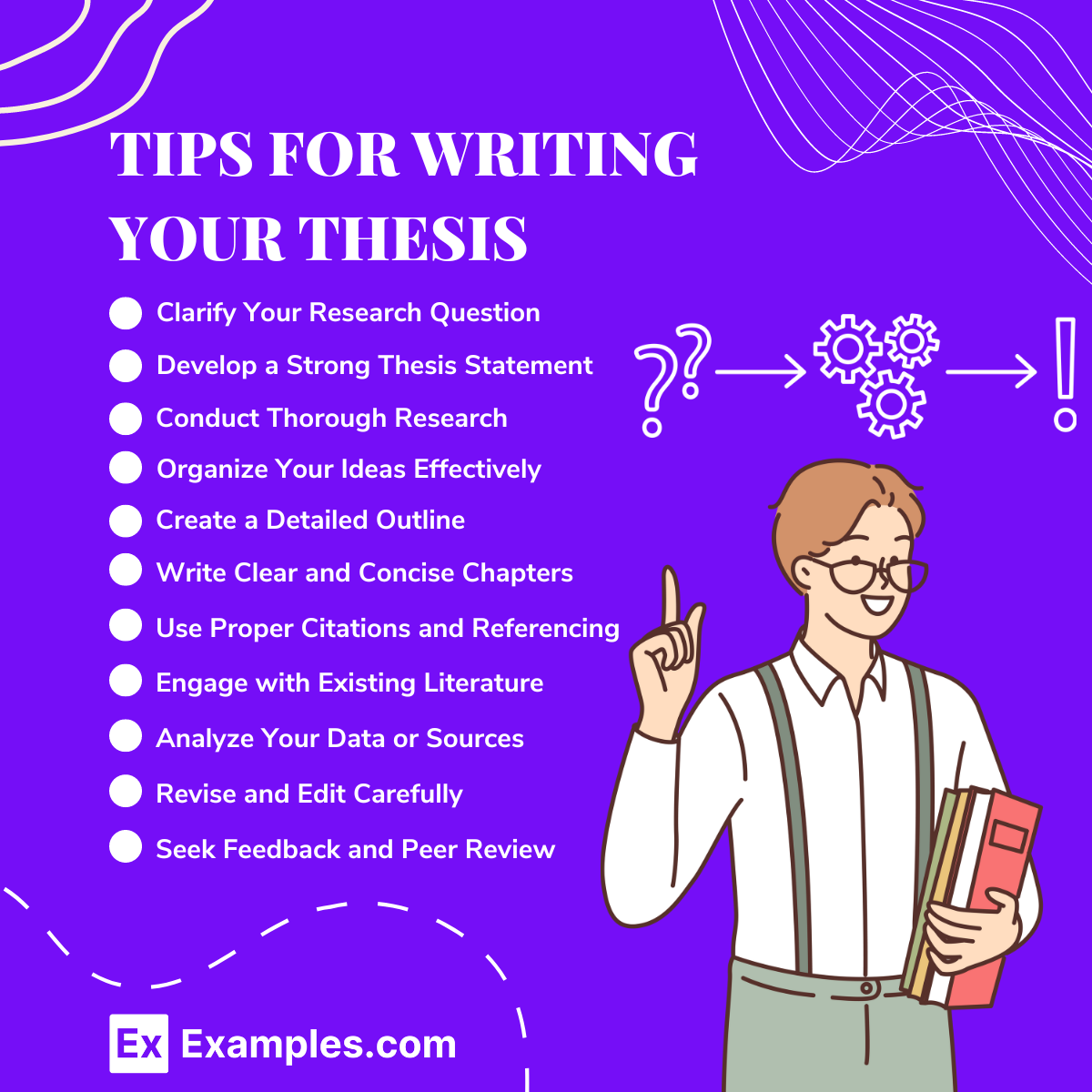
Start Early
Choose a Relevant Topic
- Select a topic that interests you and has sufficient research material available. Ensure it is specific enough to be manageable but broad enough to find sources.
Develop a Strong Thesis Statement
- Craft a clear, concise thesis statement that outlines the main argument or focus of your paper. This will guide your research and writing.
Create an Outline
- Plan your thesis structure with a detailed outline. Include sections for the introduction, literature review, methodology, results, discussion, and conclusion.
Conduct Thorough Research
- Use a variety of sources, such as books, journal articles, and credible websites. Take detailed notes and organize your research to support your thesis statement.
Write in Stages
- Break down the writing process into manageable stages. Start with the introduction, move to the literature review, then the methodology, and so on.
Maintain Consistent Formatting
- Follow the required formatting style (e.g., APA, MLA, Chicago) consistently throughout your thesis. Pay attention to citation rules and references.
Seek Feedback
- Regularly consult with your advisor and seek feedback from peers. Incorporate their suggestions to improve your work.
Edit and Revise
- Set aside time for multiple rounds of editing and revising. Check for clarity, coherence, grammar, and spelling errors.
Stay Organized
- Keep all your research materials, notes, and drafts well-organized. Use tools like folders, labels, and reference management software.
Stay Motivated
- Set small, achievable goals and reward yourself for meeting them. Stay positive and remember that writing a thesis is a marathon, not a sprint.
Proofread Thoroughly
- Conduct a final proofread to catch any remaining errors. Consider using grammar checking tools or hiring a professional proofreader.
What to include in a Thesis
Writing a thesis involves several critical sections that contribute to the overall structure and argumentation of the research. Here’s a guide on what to include in a thesis:
1. Title Page
- Title: Clear, concise, and descriptive.
- Author’s Name
- Institutional Affiliation
- Date of Submission
- Advisor’s Name
2. Abstract
- Summary: Brief overview of the research.
- Key Points: Main objectives, methods, results, and conclusions.
- Word Limit: Typically 150-300 words.
3. Table of Contents
- Sections and Subsections: With corresponding page numbers.
4. List of Figures and Tables
- Figures/Tables: Numbered and titled with page numbers.
5. Introduction
- Background: Context of the study.
- Problem Statement: The issue being addressed.
- Objectives: What the research aims to achieve.
- Research Questions/Hypotheses: Specific questions or hypotheses the study will test.
- Significance: Importance of the study.
6. Literature Review
- Overview of Existing Research: Summarize previous studies.
- Theoretical Framework: The theories guiding the research.
- Gaps in Literature: Identify what has not been addressed.
7. Methodology
- Research Design: Type of study (e.g., qualitative, quantitative).
- Participants: Who was involved in the study.
- Data Collection: How data was gathered (e.g., surveys, experiments).
- Data Analysis: Methods used to analyze the data.
- Ethical Considerations: How ethical issues were handled.
8. Results
- Findings: Present data and key results.
- Visuals: Use tables, graphs, and charts for clarity.
- Statistical Analysis: Include relevant statistical tests.
9. Discussion
- Interpretation of Results: What the findings mean.
- Comparison with Existing Literature: How results align or contrast with previous research.
- Implications: Practical or theoretical implications.
- Limitations: Discuss limitations of the study.
- Future Research: Suggestions for future studies.
10. Conclusion
- Summary of Findings: Recap main findings.
- Restate Importance: Reiterate the study’s significance.
- Final Thoughts: Concluding remarks.
11. References
- Citations: Complete list of all sources cited in the thesis.
- Formatting: Follow a specific citation style (e.g., APA, MLA).
12. Appendices
- Supplementary Material: Additional data, questionnaires, or detailed descriptions.
Thesis vs. Dissertation
| Aspect | Thesis | Dissertation |
|---|---|---|
| Purpose | Demonstrates mastery of a subject | Contributes new knowledge to the field |
| Level | Typically for Master’s degree | Typically for Doctoral (PhD) degree |
| Length | Generally shorter (50-100 pages) | Generally longer (100-300+ pages) |
| Research Focus | Focuses on existing research and literature | Involves original research and data |
| Research Type | May involve original research or analysis | Primarily involves original research |
| Structure | Structured around existing knowledge | Structured around original findings |
| Goal | Show understanding and ability to analyze | Show ability to conduct independent research |
| Time to Complete | Typically 1-2 years | Typically 2-5 years |
| Committee | Usually reviewed by a smaller committee | Reviewed by a larger committee and public defense |
| Outcome | Demonstrates competency in the field | Advances knowledge in the field |
How do I know if my Thesis is strong?
Clear and Specific Thesis Statement
- Precision: Your thesis statement should be clear, specific, and concise. It should articulate the main argument or focus of your thesis.
- Focus: Ensure it directly addresses the research question without being too broad or vague.
Well-Defined Research Question
- Relevance: The research question should be significant to your field of study.
- Feasibility: Make sure it is practical and manageable within the scope of your resources and time frame.
Comprehensive Literature Review
- Depth: Your literature review should cover relevant research and show an understanding of key theories and findings.
- Gaps Identification: Highlight gaps in the existing literature that your thesis aims to fill.
Solid Methodology
- Appropriateness: The chosen methodology should be suitable for answering your research question.
- Detail: Clearly describe your research design, data collection methods, and data analysis procedures.
- Justification: Explain why these methods are the best fit for your study.
Strong Evidence and Analysis
- Support: Provide ample evidence to support your thesis statement and arguments.
- Critical Analysis: Critically analyze the data, showing how it supports or contradicts your hypothesis.
- Consistency: Ensure that all evidence is consistently interpreted and integrated into your argument.
Coherent Structure
- Organization: The thesis should be well-organized with a logical flow of ideas.
- Clarity: Each section should clearly contribute to the overall argument.
- Transitions: Use smooth transitions between sections to maintain coherence.
Original Contribution
- Innovation: Your thesis should offer new insights or findings in your field.
- Significance: Highlight the importance and impact of your research.
Proper Formatting and Style
- Formatting: Follow the required formatting guidelines (APA, MLA, Chicago, etc.) consistently.
- Grammar and Spelling: Proofread your work to ensure it is free from grammatical and spelling errors.
- Citations: Properly cite all sources and provide a comprehensive reference list.
Feedback and Revision
- Advisor Feedback: Regularly seek feedback from your advisor and incorporate their suggestions.
- Peer Review: Get input from peers to identify areas for improvement.
- Multiple Revisions: Be prepared to revise your thesis multiple times to enhance its quality.
Self-Assessment
- Alignment: Ensure that all parts of the thesis align with the thesis statement.
- Completeness: Check that all required sections are included and thoroughly addressed.
- Confidence: Be confident in your arguments and the quality of your research.
How to Make a Thesis
Where do you often begin when you want to make a thesis? Many may say to begin by drafting, to begin by making an outline or to start at the introduction. A lot of these answers may even confuse you and may make you think that making a thesis is difficult or confusing. Stop right there, there are answers to every question, and to show you the thesis statement writing tips.
Step 1: Make an Outline for the Thesis
Start out by making a thesis outline. The outline will help you as it acts as the backbone of your entire thesis. Making outlines also help you by giving you a good view of what comes first, what should be added here and what should not be added. Outlining your thesis is often the best way to begin.
Step 2: Start with a Thesis Proposal for Your Thesis Paper
Once you have a blank outline for your thesis, which you will be filling out in order to know what goes first, the next thing to do is to pick a topic or pick a thesis proposal. This is an important part of making your thesis paper. Start with thinking about what kind of thesis proposal you want to talk about.
Step 3: Write Down the Introduction of Your Thesis
Thesis introduction has an important role to play. Its role in your thesis is to give a short summary of what can be expected in your thesis. The introduction of your thesis is all about the topic or the proposal of your thesis. When you write your thesis, make sure that the introduction should be clear and concise. After the introduction, the heart of your thesis will follow.
Step 4: Finalize Your Thesis Paper
Finalizing your thesis paper may take a lot of time and effort. But not to worry. It is always necessary and understandable that finalizing your thesis paper is important. As long as you are making sure that everything that is necessary, the introduction, the proposal, the thesis problem, solution and conclusion are present.
How do I choose a thesis topic?
Choose a topic that interests you, has ample research material, is specific enough to be manageable, and aligns with your academic goals.
How long should my thesis be?
Thesis length varies by discipline and degree level; Master’s theses are usually 50-100 pages, while PhD dissertations can be 100-300+ pages.
What is a thesis statement?
A thesis statement is a concise summary of the main point or claim of your thesis, guiding your research and writing.
How do I structure my thesis?
A typical thesis structure includes a title page, abstract, table of contents, introduction, literature review, methodology, results, discussion, conclusion, and references.
How important is the literature review?
The literature review is crucial as it contextualizes your research, highlights gaps, and demonstrates your understanding of existing scholarship.
What is the difference between a thesis and a dissertation?
A thesis is usually for a Master’s degree and demonstrates mastery of a topic, while a dissertation for a PhD contributes new knowledge to the field.
How do I manage my time effectively while writing my thesis?
Create a detailed timeline, break the process into manageable tasks, set deadlines, and regularly consult with your advisor.
How do I ensure my thesis is original?
Conduct thorough research, properly cite sources, use plagiarism detection tools, and contribute unique insights or findings to your field.
What should I do if I encounter writer’s block?
Take breaks, set small writing goals, change your environment, seek feedback, and stay connected with your advisor for guidance and support.



